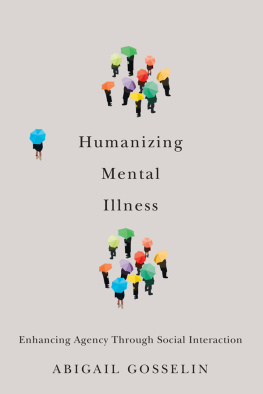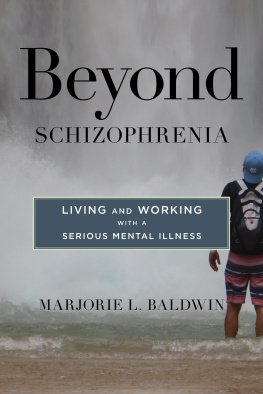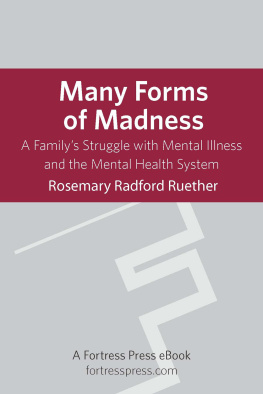STIGMA
An Ethnography of Mental Illness
and HIV/AIDS in China
STIGMA
An Ethnography of Mental Illness
and HIV/AIDS in China
Jinhua Guo
Peking University, China
Published by
World Century Publishing Corporation
27 Warren Street, Suite 401-402, Hackensack, NJ 07601
Library of Congress Cataloging-in-Publication Data
Names: Guo, Jinhua (Associate professor)
Title: Stigma : an ethnography of mental illness and HIV/AIDS in China / Jinhua Guo (Peking University, China).
Description: New Jersey : World Century, 2016.
Identifiers: LCCN 2015040537 | ISBN 9781938134807 (alk. paper)
Subjects: LCSH: Mental illness--Social aspects--China. | HIV infections--Social aspects--China. AIDS (Disease)--Social aspects--China.
Classification: LCC RC460 .G86 2016 | DDC 362.19697/9200951--dc23
LC record available at http://lccn.loc.gov/2015040537
British Library Cataloguing-in-Publication Data
A catalogue record for this book is available from the British Library.
Copyright 2016 by World Century Publishing Corporation
All rights reserved. This book, or parts thereof, may not be reproduced in any form or by any means, electronic or mechanical, including photocopying, recording or any information storage and retrieval system now known or to be invented, without written permission from the publisher.
For photocopying of material in this volume, please pay a copying fee through the Copyright Clearance Center, Inc., 222 Rosewood Drive, Danvers, MA 01923, USA. In this case permission to photocopy is not required from the publisher.
In-house Editors: Suraj Kumar/Qi Xiao
Typeset by Stallion Press
Email:
Printed in Singapore
About the Book
Based on two and a half years of fieldwork in China from 2005 to 2007, this book is aimed to examine the cultural genesis and social mechanisms of stigma related to mental illness and HIV/AIDS in China. In Chinese society where concern about human rights is weak, if it is not completely absent, because of the moral common sense of what makes a person, people with mental illness and HIV/AIDS are categorized into the group of non-persons. Non-persons do not experience social acceptance. They are socially excluded. They do not have rights. And thus they are stigmatized and discriminated against. This dangerous cultural form of moral common sense, and the ways families, local communities and state institutions respond to perceived social insecurity the threat allegedly posed by people who have mental illnesses and HIV/AIDS mutually shape each other. They work to maintain and strengthen the cruel and injurious stigma associated with mental illness and HIV/AIDS.
In the Chinese context, people with mental illness are considered to be non-persons on account of their mental disabilities; while people with HIV/AIDS are regarded as non-persons because of what they are believed to have done that caused their HIV/AIDS status. I trace how people with mental illness and HIV/AIDS are socially excluded from their existing social relationships and social networks in their local communities. I highlight families as a major site of stigma to describe the micro socio-dynamic process of stigmatization in the local context. People with mental illness usually experience a terrible identity transformation: From being a person to being a non-person and, in the extreme case of psychosis, to being a non-human who is rejected and abandoned by the family. People with HIV/AIDS generally experience the reverse transformation: From being a non-human in the family to being a non-person in society.
Through comparison of mental illness and HIV/AIDS, I connect Chinese society and its community-centered social value system to the stigma associated with mental illness and HIV/AIDS. I analyze how discrimination is understood in Chinese daily life and explore the links between disadvantaged groups and the stigmatized. Ultimately this research implies the need to develop human rights-concerned legislation and national policies. It also strongly supports the development of humanitarian ethics-centered professional education and institutional reform in health care systems and public education among the general population in China in order to counteract the catastrophic effect of stigma associated with mental illness and HIV/AIDS and other human conditions.
Jinhua Guo
Contents
Acknowledgments
Without the generous help and consistent support of many people, I would have never been able to complete this work. Arthur and Joan Kleinman are at the top of the list of people to whom I owe a lifetimes gratitude. During the seven years of my studying anthropology at Harvard University (20012008), Arthur and Joan guided and cared for me without any reservation. The Chinese saying states that yi ri wei shi, zhong sheng wei fu, meaning that he who teaches you for a day deserves to be respected as your father for a lifetime. I am not sure if I have treated Arthur and Joan as the Chinese saying requires, but they have been taking care of me with all their hearts as if I were one of their children. What Arthur has been giving to me is not just academic training, such as teaching me in the classroom, guiding my reading, giving comments on my works, helping me with my language and even editing my writing, but the long-term care and education to think and act as a responsible scholar who really cares seriously about society and the subjects he is studying. The most valuable lesson I have learned from Arthur is that a medical anthropologist, rather than just using abstract theories to argue about and criticize a variety of unjust human conditions, must always make equal efforts to work with institutions to change and improve these conditions.
I also want to express my gratitude to many professors in the Department of Anthropology at Harvard University. Professors Byron Good and Steve Caton are on my dissertation committee. They have been teaching me, supervising my research and offering me valuable guidance, advice and comments. I would also like to thank Professors James Watson, Theodore C. Bestor, Mary Steedly, Michael Herzfeld and Nur Yalman for letting me sit in their classrooms and listen to their instruction. I am deeply grateful to Marilyn Goodrich (Dr. Kleinmans Faculty Assistant), Sue Hilditch (Wing Assistant of Social Anthropology), Marianne Fritz (Graduate Program Administrator) and Monica Munson (Director of Administration of the Department) for always rescuing me whenever I asked them for help. An extra thanks goes to Marilyn and Marianne for helping me with English language writing style. The HarvardYenching Institute sponsored my study at Harvard University. My field research was supported by the Department of Anthropology and by the Michael Crichton Fund for medical anthropology in the Department of Social Medicine, Harvard Medical School. I also received financial support from the Graduate School of Arts and Science at Harvard University. I am grateful to all these institutions.
In China, my fieldwork of two and a half years from 2005 to 2007 would have been impossible without the friendship and hospitality of many medical professionals and other staff members working at the institutions I visited. They are Drs. Du Hui, Yuan Shutian, Zhang Junfeng, Zhong Bao and Zhao Pu in Jianan City, Hubei Province; Huang Shuanglong, Director of the local health bureau and Dr. Xiao Zhibing in Jiangxia City, Hubei Province; Party Secretary Liu Jianying, Youth Leagues Secretary Han Jing, Drs. Xu Keyi, Lun Wenhui and Wang Kerong at Ditan Hospital in Beijing; Drs. Zhang Jianbo, Li Qingling, Yang Diao and Yang Chaogui, and Nurse-in-Chief Zhou Xuying and nurses Yang Ling, Liu Yuling, Liu Chunyan and Yang Jia in Dexin City, Yunnan Province. A special thanks goes to hundreds of anonymous patients and their families I met during fieldwork. They educated me through their own life experience and I learned deeply about how they have been struggling to live a moral life in situations featuring social exclusion.









